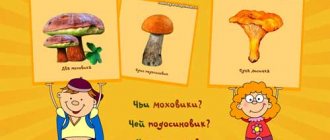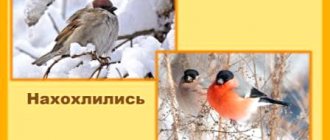Extracurricular lesson on the surrounding world “Titmouse Day” in elementary school
Summary of an extracurricular lesson “Titmouse Day” in an elementary school
Author Lyapina Vera Valerievna primary school teacher MBOU Secondary School No. 47 g.o. Samara Description This material can be used for extracurricular activities in the course “The World around us” in primary school and secondary school. Goal: Formation of new natural history, environmental and moral knowledge and skills. Expanding the scope of interest in nature, developing a caring attitude towards nature. Objectives: To expand the scope of interest in nature, to form a caring attitude towards nature.
Introduce the history of Titmouse Day. Deepen the study of the curriculum about bird life. To cultivate a moral culture, to awaken a kind attitude towards birds, to help see the difficulties that birds experience in winter, to instill a love for their native nature. Progress of the lesson
Organizational moment Good afternoon, guys!
Our lesson today is dedicated to our smaller brothers - birds. Or rather, one of the representatives of birds. Topic message Listen and try to guess who we are going to talk about today. A small and motley bird, Not afraid to catch a cold in winter, She dreams of our treats, Flies to us often (Tit). Yes, you guessed it. This is a titmouse. Today we will get to know this bird better and learn a lot of interesting things about it. And our naturalists will help us. Introduction to a new topic 1 Naturalist Here is a tit - this bird does not fly to foreign countries, and the strange wind does not interfere with its having fun at home. Even the blizzard is not a hindrance to her, nor the frost that is getting so strong. For her, in the cold, it’s a joy to drum with her thin beak and knock. - Did not you forget? How long can I knock on your door? Who lives in the apartment now? Should I fly or wait? Well, of course, wait, we’ll hang up Salo soon. It rang. I got pecked. All. I'm full. It's warmer now. Teacher Yes, indeed, we can meet titmice near human habitation precisely at the end of autumn and, of course, in winter. For a very long time in Rus', on November 12, Sinichkin Day was celebrated.
2 Naturalist Titmouse Day Nina Luchinina Who are you, little birds? Exactly at noon outside the window, the titmice were zinging, zinging, and blooming all around. As soon as the sun warmed up, they gathered in a friendly flock and boldly flew for food - there they fluttered up and down. They invite all their girlfriends, out of unheard of generosity, to dine at the feeders that the people hung out for them. It will be a holiday, right, - In the cold, in the middle of winter, a large horde of chirpers and whistlers will fly to you. You will hear behind the fence: “Zin-zin-zin”, and “shadow-shadow-shadow.” Enjoy this joy - the song is sung by Titmouse's day! 3 naturalist Today is a holiday, meet the titmice, pour plenty of food into their feeders, in the spring the goodness will return to you in abundance, After all, even the birds do not forget it. Teacher On this day, November 12, people are preparing to welcome feathered guests who remain for the winter in our area. And they meet not only titmice, but also others: waxwings,
bullfinches,
jays,
tap dancer
and goldfinches.
This day is celebrated according to the ancient Russian folk calendar. He is also called Zinovy. People noticed that it was on this day that tits began to fly from the forest closer to people, to their homes, and were waiting for help from people. The titmouses brought frosts on their wings. If whole flocks of titmice are circling around people’s houses, expect frost. Do you guys know why the titmouse was named that? (Children’s answers) You are mistaken, not because the bird’s plumage is blue, but because it sings ringing songs that resemble the ringing of bells: “Si-si!” How can people prepare for meeting birds? (Children's answers) Of course, people prepare food for them. 1 Naturalist The wings and paws are freezing, It has become very cold, Those who are chilly have flown away, We will spend the winter. We fly closer to people, It’s warmer and more satisfying here, And in the feeder, like on a platter, There are a lot of crackers... They hang lard on a thread, And they take care of us! People have everything in abundance, There is a large supply in the pantry.. Feed the little bird, Pour food onto the shelf, We feel bad without you in winter, Don’t spare the crust!
Children and their parents build feeders and hang them on trees. They also prepare food for their feathered friends. Delicacies for birds include seeds, nuts, and fresh lard. Tits are generally very voracious - they eat all day long, so there should always be food in the feeders. It is interesting that this little blue bird puts all the grains that do not fit into the stomach in a hollow or other secluded place, and then returns for food. People have signs associated with tits. 2 Naturalist On Zen's Day, titmouses fly to us, observing their behavior, People determine the weather. If it whistles cheerfully, it means a clear good day, If it squeaks, it means the night frost. Folk signs Many tits at the feeders mean a blizzard or snowfall. • Tits fly away early to warmer climes - it will soon get colder. • The appearance of a blue tit at the feeder is fortunate.
• A tit knocking on the window means good news, a gift.
• When a tit sits on your hand, you need to make a wish, and if the bird gives its voice, your wish will come true.
• Catching a tit in a dream is a sign of overcoming troubles and achieving goals. Since the 17th century, royal decrees prohibited killing tits. And whoever killed this bird was subject to severe punishment - they could either be flogged or receive a large fine. Because the tit was known in Rus' as the blue bird of happiness. Fizminutka A nimble tit is jumping (jumping in place on two legs) She can’t sit still, (jumping in place on the left leg) Jump - hop, jump - hop, (jumping in place on the right leg) Spun like a top. (spinning in place) So she sat down for a minute, (sat down) Scratched her chest with her beak, (stood up, tilted her head left and right) And from the path - onto the fence, (jumping in place on the left leg) Tiri - tiri, (jumping in place on right leg) Shadow-shadow-shadow! (jumping in place on two legs) Teacher The titmouse has a lot of sisters. 3 Naturalist Tits are forest birds and can be found here in any season. During non-breeding times, tits often stay in mixed flocks, willingly visit feeding areas in parks and are therefore well known to nature lovers. The most common chickadee
tufted tit
blue tit
Moscow
big tit
remez
All tits - hollow-nesters, puffy tits and tufted tits - hollow out their own hollows, while others occupy natural niches in trees or empty woodpecker hollows. Since tits are small birds, they most readily move into hollows made by the Lesser Spotted Woodpecker. In all cases, they use hollows and niches only as shelter for their own nest, the basis of which usually consists of green tree moss, lichen, animal hair, and sometimes “plant wool.” In addition, the lining almost always contains feathers. Moss and lichens are usually collected by the male, while more delicate building material is collected by the female. But if we talk about the construction of tit nests, then we need to mention the famous builder. Somewhere on the bank of a river or pond, on a bent branch of a willow or poplar, hangs a fairly large bag (10 centimeters wide and 16 centimeters long), from a distance resembling a mitten with one finger. This is a nest of blue tits.
It is carefully woven from plant fibers, decorated and insulated with down, flying leaves of various trees and shrubs. The nest is so strong that it is not afraid of either heavy rain or wind. In this nest (the birds build it for at least two weeks), the remez hatch and feed the chicks (for a total of three weeks), and then leave this magnificent structure without regret. Game “Wintering Migratory Birds” Description of the game The leader gives each child the name of the bird: some are migratory, some are wintering. For example: heron, bullfinch, cuckoo, crow, swallow, woodpecker, crane, nightingale, owl, parrot, crossbill, etc. At the command of the leader, wintering birds must gather in one flock, and migratory birds in another. Then each flock looks to see if there are any strangers, and if there are, they drive them out with a scream. So, all the migratory birds have gathered in a flock and are ready to fly away. Game “Bird Concert” Each group of children of 3 people is given the name of the bird, then say how they sing: • Sparrows - chirp - chirp • Tits - ting - ting • Crow - caw - caw • Woodpecker - trrr - trrr • Bullfinch – du – du – du • Crossbill – clop – clop – clop • Waxwing – tyur – tyur – tyur The guys sing a song to the tune of “A grasshopper sat in the grass.” Each bird has a line. Our concert turned out to be wonderful. Consolidation 1 Naturalist Gray November has whisked away all the fallen leaves; driven by the wind, she flew away into that distance that is inaccessible to anyone in the world. She flew and grumbled, so timidly. Like bare trees, everything is dark. They, lost in their dreams, do not know dull melancholy, they are full of sweet visions when life was in full swing with a green reality. On Titmouse's day there are so many different birds in the forest. They are waiting for help with hope, faith that we will not forget about them, everyone is looking down - to where we are pouring food for them in full measure. Spinning in a very slow dance, the snowball falls to the ground and melts, knowing that having made its simple jump, the snowfall will return to a snowy paradise... Summing up Teacher What day did you learn about today? (children's answers) Why are tits called that? What types of tits do you remember? Why do people care about birds in winter? What are they doing for this? How can we help our feathered friends? Don't forget about our little brothers. And my homework is to make feeders at home and bring them to the next excursion lesson. We will go to our school yard and hang your feeders. But just don't forget to bring food for our friends. WE HAVE THIS CUSTOM: AS soon as a snowball FALLS, HANG THE BOARD BIRD HOUSE ON A KNOGGLE. AND HERE, IN THE GARDEN BEHIND THE HOUSE, AMONGST THE GRAY BRANCHES, THE CHILDREN'S FUN LUNCH IS READY FOR THE BIRDS! This concludes our lesson. Until next time.
We recommend watching:
Scenario for an autumn disco for 3rd grade students Scenario for the Autumn Ball in 3rd grade Summary of an extracurricular activity in elementary school on the topic: Autumn Autumn Festival. Scenario for grades 2-4
Similar articles:
Scenario for an autumn holiday in elementary school
Scenario for the autumn holiday in 1st grade
Autumn Festival in 4th grade. Scenario
Scenario of the autumn holiday for 1st grade
Scenario of the autumn holiday for primary schoolchildren
Summary of GCD in the preparatory group Topic: “Very useful bird Titmouse”
Eleanor Bucairan
Summary of GCD in the preparatory group Topic: “Very useful bird Titmouse”
• Supplement children's knowledge about birds, which help preserve the forest from harmful insects.
• Expand children's knowledge about the tit and its benefits in nature.
• Speech development and vocabulary activation.
• Learn to compare, analyze, establish simple cause-and-effect relationships.
• Development of attention, memory, thinking.
• To develop children's cognitive interest in living nature.
• Foster a caring attitude towards nature, create a desire to help birds.
Preliminary work: Conversations with children about migratory and wintering birds; reading poems and stories about birds; bird watching on walks; looking at illustrations.
Material: Demonstration pictures, audio recordings, slides on electronic media; pictures for games.
Visual: showing pictures, showing slides.
Verbal: teacher’s story, search questions.
Practical and gaming: listening to audio recordings, physical exercises, didactic games.
Integration of educational areas:
“Cognitive development”/consolidation of knowledge, expand information about an individual bird/; “Speech development/participation in problem-search dialogue, didactic games/; “Socio-communicative development”/interaction between children and adults in dialogue, games, development of moral qualities/; “Artistic and aesthetic” /seeing the beauty of living nature, the desire to color and draw tits/ ; “Physical development”/physical training to relieve fatigue/.
Modern educational technologies: ICT (self-created slides, audio recordings, games, health-saving (dynamic pause)
.
Lesson summary "Titmouse's Day"
Olga Sidorova
Summary of the lesson “Titmouse’s Day”
Lesson summary " Titmouse's Day "
.
• to form in children a general idea of tits , their benefits for humans,
features of their appearance and behavior.
• introduce children to the tit and the holiday “ Titmouse Day ”
• learn to distinguish tits from other bird species
• cultivate a kind, caring attitude towards nature, develop an interest in the life of birds.
Material and equipment:
• ICT, audio recordings, pencils, coloring books, object pictures.


